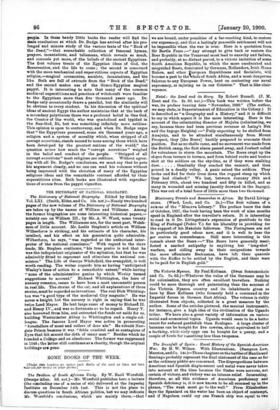THE DICTIONARY OF NATIONAL BIOGRAPHY.
The Dictionary of National Biography. Edited by Sidney Lee. Vol. LXI. (Smith, Elder, and Co. 15s. net.)—Nearly two hundred pages of the new volume of The Dictionary of National Biography are taken up by the names of William and Williams. Among the former biographies are some interesting historical papers,— notably one on William III., by Mr. A. W. Ward, some twenty pages in length. The Williamses are, for the most part, Welsh- men of little account. Mr. Leslie Stephen's article on William Wilberforce is striking, and his estimate of his character, his intellect, and his effect on his generatini quite admirable. Wilberforce, he says, "was regarded as the authorised inter- preter of the national conscience." With regard to the slave trade, Mr. Stephen continues, "his true praise is not that he was the independent originator of the agitation, but that he was admirably fitted to represent and stimulate the national con- science." The Life of George Whitefield, the evangelist, is well worth reading. The writer regards him as having "anticipated Wesley's lines of action to a remarkable extent," while having "none of the administrative genius by which Wesley turned suggestions to account." Richard Whittington, the hero of nursery romance, seems to have been a most unromantic person in real life. The stories of the cat, and all explanations of those stories, must be regarded as inventions. The real Dick Whiffing- ton was "a good type of the medimval City magnate." He was never a knight, but the nursery is right in saying that he was twice Lord Mayor. He lent large sums of money to Richard II. and Henry IV., and was so fortunate as to be repaid. Henry V. also borrowed from him, and entrusted the funds set aside for re. building Westminster Abbey to Whittington and a single col- league. The famous Lord Mayor was active in prosecuting " forestallers of meat and sellers of dear ale." He rebuilt New- gate Prison because it was "fable overlitel and so contagious of Eyre that lilt caused the deth of many men." Besides which he founded a College and an almshouse. The former was suppressed in 1548; the latter still continues as a charity, though the original buildings aro gone.






































 Previous page
Previous page